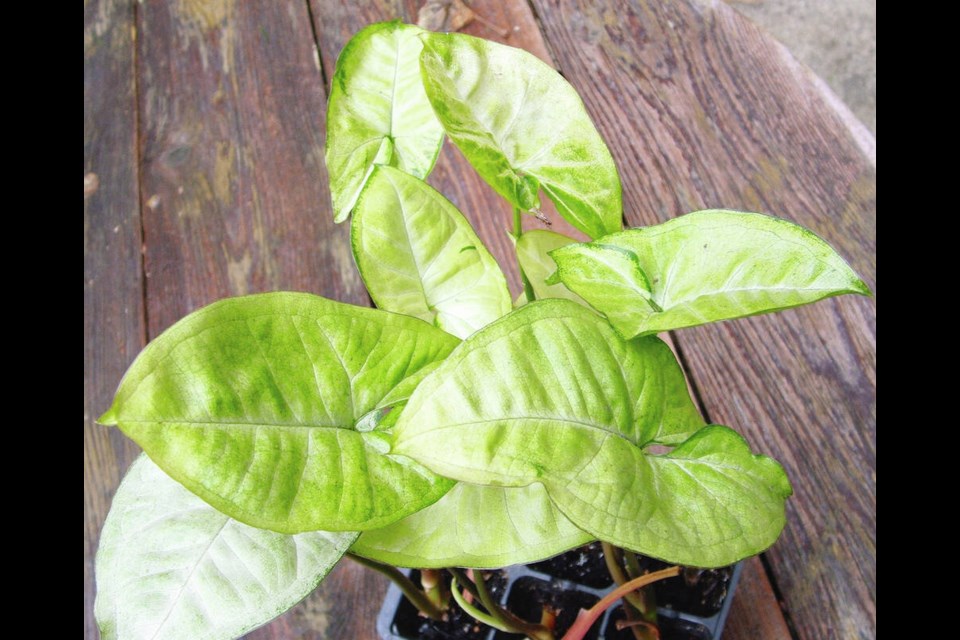Dear Helen: Why has my arrowhead plant flopped right over?
P.B.
Arrowhead (Syngonium), like most plants, will do a nose dive if the soil has been allowed to dry. The same will happen if the soil is kept wet, which can set up rotting in the roots and subsequent plant collapse.
If the issue is dry soil, the plant will quickly revive if watered slowly and judiciously. If the soil is sodden, let it dry. In either case, if the plant does not recover fairly quickly, unpot it and check the roots. Trim off any rotted roots and repot in fresh all-purpose potting mix.
I have several arrowheads among my house plants. I find them easy plants, but mine have done a flop or two when I’ve neglected them.
I gave up on house plants for a few years, because I had no time to care properly for them. That all ended with my discovery of sturdy, 75-cm long windowsill trays to set on ledges at the dining room and living room windows. They make watering and adequate humidity levels easy with the occasional bit of tepid water dribbled into the trays.
Not sure whether to water at soil level? Lift the pot. If it feels lighter than it does usually, water.
Dear Helen: Are all sunflowers good sources of pollen for bees?
B.A.
No. Some have been bred with little or no pollen, for use as “cutting” flowers. An example is Gummy Bear, a branching plant 90 to 120 cm tall, with fluffy, densely petal-packed flowers that produce minimal pollen, which makes it ideal for cutting.
Check seed packets and catalogue listings for detailed information on sunflowers that attract you. Johnny’s Selected Seeds identifies each of its many sunflower varieties as pollenless, pollen bearing, or minimal pollen bearing.
Dear Helen: I am trying to plant and manage my garden as chemical-free as possible, and want to use what you term “natural-source” fertilizers with seed meals as the usual main source for nitrogen. My concern is pesticide residues in those seed meals. Is this not a problem? Are some grown from genetically modified seeds?
P.G.
When I switched to slow-acting, natural-source fertilizers decades ago, it was my understanding that the oilseed meals I used, which are the residues left after oils have been extracted from the seeds, were not a problem, and that harmful elements in the seeds ended up mainly in the extracted oils.
More current research indicates that varying amounts of pesticide and herbicide residues do remain in seed meals. Only meals from certified organically grown seeds can be considered pesticide free.
Seed meals available in some outlets include soy, canola, cotton, flax and alfalfa. Soy, canola and cotton seed meals are likely to be genetically grown.
I use mainly alfalfa meal, because it is the most commonly available in outlets near me. Though genetically modified Roundup Ready alfalfa was approved for growing in Eastern ÎÚÑ»´«Ã½ in 2021, I think that alfalfa is still probably the safest seed meal sold here. It is also a perennial crop, which eliminates the need for new seeds being introduced each year.
GARDEN EVENTS
Special plants. The Victoria Hardy Plant Group will meet this evening (Wednesday, April 17) at 7 p.m. in the Couvelier Pavilion at Horticulture Centre of the Pacific, 505 Quayle Rd. Justin Dunning of Canadian Carnivorous Plants will present a talk and slide show on these special plants. He will be bringing plants for sale.
Introduction to new plans. The Horticulture Centre of the Pacific’s next workshop in the monthly series Plant Identification and Culture with Jane Tice will be on Saturday, April 20, 1 to 4 p.m. Each session introduces 20 new plants that fit in with our local climate. Cost for HCP members $40 per session. Others $50. To register, call 250-479-6162 or at .
Rock and Alpine show and sale. The Vancouver Island Rock and Alpine Garden Society will host its annual Spring Show and Sale on Sunday, April 21, 9 a.m. to 4 p.m. in the Mary Winspear Centre in Sidney. The public is invited to enjoy fine exhibits of alpine, woodland, bog and succulent plants and other displays. There will be club and vendor plant and seed sales, door prizes, a silent auction and tea service. Admission is by donation. More details at .



